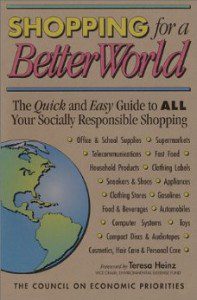1. “Doubt climate change? Here, have a cigarette …”
2. Addie Zierman offers some hopeful and helpful thoughts about “Jeans, Social Justice, and One Small Thing.” That post is a good discussion of the frustrations of trying to shop ethically on a limited budget and with limited time and information. Her approach — “Maybe next week, one more small change. Maybe the following week, another” — strikes me as wise and human and empowering, rather than guilt-inducing. (Guilt without alternatives tends to be paralyzing — fostering resentment more than resolution.)

“I wish there was a chart,” Zierman writes. “It would be so simple if there were charts that included wages and cost of living and safety ratings, and you could just pull it up on your phone …”
There used to be an app for that. Well, not an app, but a handbook, actually. It was called Shopping for a Better World, and it was updated annually throughout the 1990s. They stopped updating it in 2000 or so, and the website for the project hasn’t been active for years.
That handbook let you look up most products/companies found at the supermarket or the mall and learn about their wages, fair-hiring practices, employment and executive diversity, safety, environmental compliance, animal testing, military contracts, criminal fines, etc. It was a terrific resource and there really ought to be an app for that.
3. Addie Zierman’s post is also a good excuse for me to get in a plug for — and a question about — my favorite brand of jeans. Diamond Gusset jeans are made in America. They used to be called “Diamond Cut” jeans, and before the rebranding they always advertised as being union made in the USA. Since they’re not saying that any more, I don’t know if that’s still the case — anyone know? “Made in the USA” isn’t important to me for jingoistic, tribal-chauvinism-masquerading-as-patriotism reasons, but it does let me know that the company has to comply with U.S. laws regarding wages, safety, etc. Plus they’re really comfortable — thanks to the famous diamond-shaped “gusset,” which avoids the old problem of having a knob of seams and stitches all coming together underneath exactly the same place where your anatomy all comes together too.
4. Hooray for actuaries! Grist’s RL Miller explains “Why the insurance industry won’t save us from climate change.” Miller’s right that insurance companies won’t be able to single-handedly solve this problem, but don’t let the pessimistic tone of the post distract you from the important — and useful — fact underlying Miller’s argument: The insurance industry is unanimously and unambiguously convinced that climate change is a huge problem.
Insurers and reinsurers have too much skin in the game to mess around with the lies and legends and delusions of climate denialists. They can’t afford to play partisan games with the data because their whole business model depends on getting the facts right. Corrupt politicians like Sen. James Inhofe can make a profit by repeating whatever lies his corporate donors ask him to say about an alleged “global conspiracy” perpetrating the “hoax” of climate change, but Inhofe and all the others promoting this conspiracy theory cannot explain why the insurance industry would commit suicide by participating in it. They have no economic incentive to lie and they have every economic incentive to get the data right. People like Inhofe or your Fox-addled relatives may reflexively reject anything said by Al Gore or NASA or the Sierra Club, but they have no basis for rejecting or resisting what the insurance industry is saying.
5. Hooray for actuaries, again! Here’s another place where insurance companies are preferring data and facts to right-wing myths and lies: They’re saying that putting more guns into schools will make schools more dangerous. The NRA may think it’s a great idea to sell more guns to teachers and custodians, but the insurance companies who cover those schools think the increased risk that would introduce is incalculably higher. Steve Benen writes:
In the wake of the massacre at Sandy Hook Elementary, far-right policymakers in a variety of states decided the appropriate response was bringing in more loaded firearms into schools, to be kept around children. This is precisely what the NRA recommended — schools will be safer, the group insisted, with armed school personnel — and policymakers acted accordingly.
But insurance companies don’t much care about political rhetoric, and have fiduciary responsibilities to consider. And wouldn’t you know it, the actuaries ran the numbers and decided insuring schools that may include gun-toting teachers is not a wise investment.
Remember, it’s not like EMC Insurance was lobbied to make this decision by the White House, Michael Bloomberg, or Gabrielle Giffords. Rather, the company made a straightforward business decision …
It’s a straightforward business decision “simply to protect the financial security of our company,” for an insurer to refuse to cover the risk of arming school zones. Just as it’s a straightforward business decision for those same insurers to urge, beg and plead with governments to do more to address the incalculable risks of climate change.
6. Speaking of “straightforward business decisions,” Charles Kuffner reminds us that “With Rick Perry, you always have to ask, ‘Who benefits?’” Why is the Texas governor incurring the wrath of hundreds of thousands of Texas women while telling “pants on fire” lies about their health care? Could it have anything to do with the fact that his sister’s company stands to profit handsomely from this new law?
7. Paul Louis Metzger on “White Theology, part I“:
A given theology might not address the issues of race. It may be the case that the theologian in question assumes that race has nothing to do with theology or that we live in a post-racialized society. To the contrary, theology had everything to do with America’s heinous, historic capitulation to racism and slavery. The Bible and theology were used as justifications for the promulgation and promotion of slavery. …
Yes. American “evangelical theology” is white theology. Its “Bible-based” approach relies on the peculiar clobber-text hermeneutic that arose in defense of America’s peculiar institution. That’s where it comes from. That’s what it’s for — what it was designed to do.
I’m looking forward to Metzger’s “part II.”















